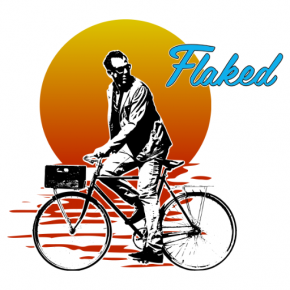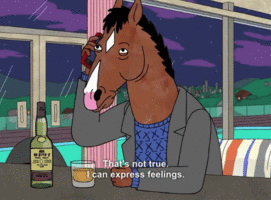
 In a few recent Netflix shows, Will Arnett plays existentially ambivalent and sometimes despondent characters with alcoholic tendencies. He voices the title role in Bojack Horseman, an animated series centering on a maladjusted former TV star who’s going broke and doesn’t know how to engage in a meaningful relationship. And in the more recent Flaked he plays Chip, an exemplary community member with a colored past, basically killing time before the lease runs out on his furniture store in Venice Beach. He produces both shows and has a larger hand in the creation and writing of the latter, which claims AA as a primary setting and the basis for many of its characters’ relationships. As it turns out, Arnett has been drawing from personal experience to best inhabit these roles, which depart from his joking turns in Arrested Development, 30 Rock and other goofy comedies. In fact, Arnett gave a recent interview detailing his struggle with alcoholism that helps draw out the autobiographical elements in these antiheroes. While filming Flaked, his proud baby, Arnett confesses that he relapsed.
In a few recent Netflix shows, Will Arnett plays existentially ambivalent and sometimes despondent characters with alcoholic tendencies. He voices the title role in Bojack Horseman, an animated series centering on a maladjusted former TV star who’s going broke and doesn’t know how to engage in a meaningful relationship. And in the more recent Flaked he plays Chip, an exemplary community member with a colored past, basically killing time before the lease runs out on his furniture store in Venice Beach. He produces both shows and has a larger hand in the creation and writing of the latter, which claims AA as a primary setting and the basis for many of its characters’ relationships. As it turns out, Arnett has been drawing from personal experience to best inhabit these roles, which depart from his joking turns in Arrested Development, 30 Rock and other goofy comedies. In fact, Arnett gave a recent interview detailing his struggle with alcoholism that helps draw out the autobiographical elements in these antiheroes. While filming Flaked, his proud baby, Arnett confesses that he relapsed.
“As I was writing all this s*** [on Flaked] and I start shooting it, I started getting confused about where I was at,” he says, then hesitates as he decides if he wants to continue. He does: “Hardly anybody knows this,” he says, pausing a second time, “but I started drinking again … I described it at a meeting recently like a whistle off in the distance for a train you know is coming for you,” he says. “It was a bummer, but it happens. And for me, it happened as easily as it had [the first time]: It was right there.” He had tried justifying the slip to himself as something he needed to do to play the part of Chip, but over time, he hated the way it made him feel. “I was filled with shame.”
Flaked can best be viewed as a traumedy: the main character endures trauma, and the audience doesn’t know whether to laugh or cry as we watch him weave narratives and use people to regain some semblance of control and safety in his life. As Arnett’s quote shows, sometimes the stories we tell ourselves get muddled and don’t make as much sense to us as they had when we were living in them or laboring to put them together. “I started getting confused about where I was at,” Arnett says. In Flaked, that train is coming for his character, Chip (as it is coming for all of us), and we watch what happens to him and his friends in Venice when it arrives. Trauma has the potential to show us how little we are in control, to collapse our tidied narratives and be reminded of our weakness and tremendous need for God’s one-way love. Such happenings in this show only push Chip to dig deeper into his deceptions and self-justifications.
We first hear of Chip’s defining traumatic event, which occurred ten years before, in a calculated speech to a room full of alcoholics. Arnett’s voice is heard over a montage of nervous mannerisms at the AA meeting: staring at cuticles, biting lower lips and chugging coffee from paper cups. Because of the dramatic weight of Chip’s transition to sobriety, along with his handsome charisma and knack for recalling program one-liners at opportune moments, he is somewhat of a model citizen and leader in Venice, especially amongst the AA crowd. Already, we observe, he has twisted his long ago “accident” into a source of power and control.
Instead of taking the language of the program and its call for surrender to a higher power seriously each and every day, Chip takes deliberate steps to stay perched upon the throne in his life. “We tell ourselves stories in order to live,” Joan Didion wrote, and, as professed adherents to the Great Story and hosts of a recent conference called “Story,” we have to admit some truth there. The stories that Chip tells himself and his friends, including the AA stump speech centering around his trauma, though, are largely fiction – harkening to other leading TV men: Don Draper, Walter White, Frank Underwood, Richie Fenestra, etc. Eventually (at the risk of giving away the plot), Chip’s best friend Dennis figures him out; thus, as is so often the case in our lives, his narrative topples in the face of a loved one.
The end of the show forces the audience to question whether the program has failed Chip. Is he really the savior of Venice, his moniker for most of the show, or is he a hopeless co-dependent relying on the blind generosity of spirit and resources from his friends whom he manipulates without any qualms? Chapter 5 of the AA Big Book delivers a devastating description of those “who do not recover.” They “are people who cannot or will not completely give themselves to the simple program, usually men and women who are constitutionally incapable of being honest with themselves. These are such unfortunates.” Will Arnett, sitting at lunch confessing his relapse to a female reporter, “was filled with shame.” Faced with an opportunity to confess and be honest with his close pal Dennis, his Chip couldn’t do it. Flaked (and Bojack) poignantly recall those moments when we don’t feel we have the strength to do the next right thing, even when it’s staring us in the face. Sometimes it’s too painful to apologize to a loved one or step in when someone else is being wronged. On the other hand, it’s easy to write off someone else’s experience or their attempts at empathy as inauthentic, not as “real” or “true” as our own. Arnett was sensitive to these emotions as he was working on the show.
Arnett’s still a bit piqued by those whom he wasn’t able to reach with the show. “When you have a [reviewer] say, ‘It’s not even a good depiction of sobriety — that they do a better job on [CBS’] Mom,’ you’re like, ‘What are you talking about?’ ” he says, his voice rising as he continues: “This is actually f—ing happening [to me], you asshole. This is actually happening in real time — as quickly as we can shoot, it’s happening.”
In part, his words are an earnest plea for serious artistic consideration of his work, but they also reveal a wounded man still struggling to develop his capacity for honesty. Arnett says that next season will feature an ashamed Chip reuniting with Dennis, who will once again help him down the path to sobriety. If a cynical audience is to buy Arnett’s plug for authenticity and his hopeful arc for ensuing episodes, they must strive to resist the human urge to assign neat and tidy endings to narrative, acknowledging that, as the Big Book states, the only way to ensure honesty and selflessness is through daily surrender to that higher power.
https://youtu.be/iKOpvm7BcOo

COMMENTS
3 responses to “Tidy Lies and Messy Truths in Flaked”
Leave a Reply















Great post, I stumbled on this show and loved it. The continued struggle even after someone has been rescued is wonderfully refreshing.
Love reading this as I rewatch the show. It’s a constant struggle for me not to cling on to tidy narratives, and oddly comforting to hear that Arnett does both in the show and in real life.